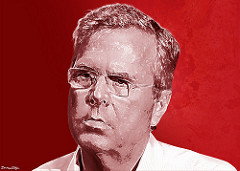Meet The Trickle-Down Conservatives Behind Jeb Bush’s Tax Plan
 Jeb Bush is scheduled to release his tax plan on Wednesday, and the Washington Post says it knows who helped him with it.
Jeb Bush is scheduled to release his tax plan on Wednesday, and the Washington Post says it knows who helped him with it.
Citing “two Republicans familiar with Bush’s schedule,” the Post reported that Bush met with Heritage Foundation economist Stephen Moore, publishing executive Steve Forbes, and CNBC commentator Larry Kudlow for an hour on Tuesday morning to discuss the details of the Republican presidential candidate’s economic plan. The three men are supply-side conservatives — meaning, among other things, that they believe in tax breaks for the rich and less economic regulation.
But these men aren’t just any trickle-down economists. They’re all high-profile proponents of Reaganomics — they all actually advised Reagan while he was in the White House. It’s also not an accident that the three of them met with Bush together. Kudlow, Forbes, and Moore recently formed a new group called the Committee to Unleash American Prosperity which, according to a summer press release, wants presidential candidates to advocate for traditional, Reaganesque economic policies — a low rate, flat tax; limited government spending; free trade; and little regulation. For what it’s worth, all three men have denied the science of global warming.
The group’s website is still under construction. But considering its founders are all advising a man who wants to be the next president, it’s worth getting to know each, one at a time.
Larry Kudlow

Larry Kudlow speaking at the 2015 Conservative Political Action Conference (CPAC) in National Harbor, Maryland.
CREDIT: Gage Skidmore/Flickr
Larry Kudlow is probably best known for his television news commentary. As the former host of CNBC’s “The Kudlow Report” and current senior contributor to the station, he muses on the potential effects of politicians’ proposed policies. He’s also a former adviser to Ronald Reagan, and according to the New York Times, the former “economic guru” of conservative radio host Rush Limbaugh.
It’s unsurprising, then, that Kudlow is decidedly against government incentive programs, arguing they encourage people to be lazy. He’s decried unemployment benefits for that reason, saying people are more likely to go back to work if they don’t receive the subsidy. It’s basically the same reason Kudlow doesn’t like Obamacare — because of its expansion of Medicaid, he argued, people are rewarded for having low income. “[Obamacare is] basically paying you not to work,” he’s said.
In the same vein, Kudlow seems more inclined to defend the intentions of the rich. In response to a 2009 Wall Street Journal story that revealed CEOs of banks receiving government bailout money were expensing personal vacation travel on private jets, Kudlow said he didn’t have a problem with it. “I think it’s great because I want to stimulate the economy,” he said. “I’m glad the CEOs are going around. I just wish they’d take me with them.”
Stephen Moore

CREDIT: Gage Skidmore/Flickr
After serving for years as the Wall Street Journal’s economics columnist, Stephen Moore joined the Heritage Foundation — arguably America’s most influential conservative think tank — as its chief economist in 2014. It wasn’t the first time he’d gone to work there — as ThinkProgress noted at the time, he served as a fellow there during the Reagan presidency.
Later, he actually joined the administration, serving as the research director of Reagan’s “Privatization Unit,” which was formed to study ways government functions could be turned over to private business. In 1988, that commission recommended contracting with the private sector for prison administration; letting private sector companies compete with Medicaid; and ending government-assisted housing. In 2010, Moore said if he “could have my ‘druthers,” he would raise taxes on the poorest Americans to finance more tax cuts for the rich.
Moore also founded the conservative Club for Growth PAC in 1999, which advocates a “vision of limited government and lower taxes.” Today, that PAC is steering donations toward five presidential candidates: Ted Cruz, Rand Paul, Marco Rubio, Scott Walker, and Jeb Bush.
Steve Forbes

Steve Forbes speaking at the 2013 FreedomFest in Las Vegas, Nevada.
CREDIT: Gage Skidmore/Flickr
During the Reagan years, current Forbes Media chairman Steve Forbes served as the chairman of the Board for International Broadcasting. Since then, he’s advised other politicians seeking the presidency — Rick Perry and John McCain — and even sought the presidency for himself, twice.
Forbes himself is extremely wealthy — his net worth is about $430 million — mostly due to the fact that his father is Malcolm Forbes, the former chairman of Forbes Magazine. In fact, Forbes has been criticized heavily for “nearly bankrupting” his father’s company in 2011 while taking hundreds of millions of dollars for himself.
At the same time, Forbes is probably best known for advocating low taxes on the rich. His preferred method would be some version of a flat tax, or a system that taxes everyone at the same rate. That method, as the American Prospect points out, also “would have also saved him a couple of billion dollars in taxes over the course of his lifetime.”
***
This has been reposted from Think Progress.
***
Jeb Bush image by Donkey Hotey.

